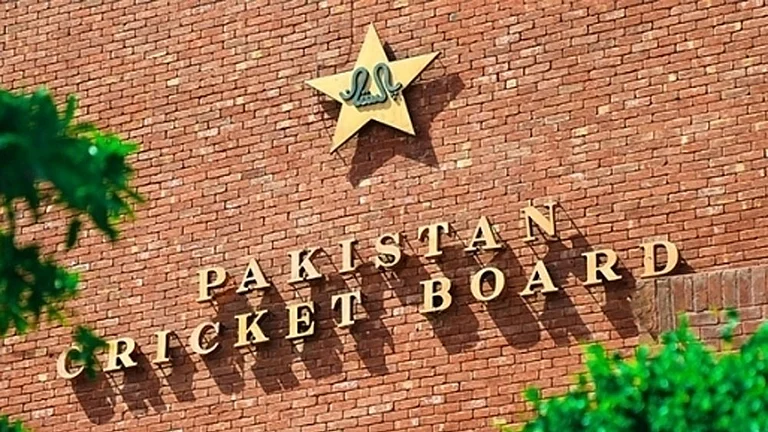THE freshly-installed hotline between Delhi and Islamabad notwithstanding, Indo-Pak relations seemed as cold as ever to people gathered on June 26 in the border villages of Chamliyal in India and Saidanwali in Pakistan. Like every other year, they had come to witness the exchange of prasad conducted by security forces at the Baba Chamliyal fair. For the first time in years, they waited in vain.
Bullet-proof sheets hemmed in the carnivalesque celebrations after firing on the border forced the Border Security Force to protect Baba's Indian devotees from 'whimsical' enemy attacks. On the other side, about 10,000 devotees at a parallel fair, held in the Saidanwali border outpost in Sialkot district, were lathi-charged by Pak rangers as their demands for prasad from the Indian shrine grew more intense.
Till 1971, Baba's Pakistani devotees crossed over the porous border to partake in the fair rituals and claim his prasad. Strained relations between the countries since then saw the numbers dwindle, but an informal trickle continued. Till, about seven years ago, the BSF stepped in to help.
And the Chamliyal fair became an occasion when enmity was temporarily suspended, security forces from both sides used military grammar to speak the language of faith—distributing prasad after flag meetings. This year, even that tradition was broken. "Understandable the exchange is not happening," observed an irate BSF jawan. "Things have gone from bad to worse at the border. We shot two Pak infiltrators in the Samba sector just yesterday. Two of our people were killed in an encounter in Mahore two days ago. These foreign secretary meetings at the top are fraud. See what happens at the ground level!"
So, barely 800 metres away from each other, thousands couldn't share the blessings of a common culture that should have bonded them further. In fervent demand was the prasad—shakkar and sherbat—a soil and water mixture that believers vouch is a miracle cure for skin ailments. Smeared all over the body for several hours over a period of time, the prasad, devotees claim, cures even stubborn skin diseases like leucoderma. For the sceptic, ample legends and case histories abound vindicating the claim.
The shrine's sexagenarian priest talks of a time when India and Pakistan were one. When, about two centuries ago, Dilip Singh Manhas dreamt of a place that had mud and water which could relieve skin patients of all their suffering. "There was a skin epidemic on then," the priest recounts. "The Baba became popular with ordinary people for having been blessed with the discovery of this place. So some jealous villagers beheaded him. This is where he fell—at this shrine—and that's why this place has become doubly blessed."
They've heard this legend many times, yet the devotees gathered around the priest cluck in wonderment. More articulate among them, 24-year-old Meenakshi Jha from Gaya, adds to the magic of the moment. Slowly she unfolds her kurta sleeves to reveal wet skin wounds. "I was born with a horrendous eczema. The scratching makes the skin raw and pus forms. I tried all types of medication and gave up. Till I discovered this place. I've already come here twice and stayed for long periods. My whole body was affected by it. Now only my arms," she proclaims. A medical student at the Gaya Homeopathy College, she's here again "because faith heals better than science".
The hundreds of mud-smeared devouts around the shrine share Meenakshi's sentiment. Patiently sitting under a scorching sun, without a drop of water or a morsel of food for hours together, they believe that Baba will cure those who adhere most rigorously to the rules laid down by him.
And there are many such rules. Listed in gaudy-pink pamphlets, these are handed out to the faithful by the priest. Those under treatment have to abstain from non-vegetarian food, oil, alcohol, touching leather, sleeping on a bed and sex. "There's no logic to faith," argues Sunil Mahendroo, 27, a farmer from Batala, Punjab. "I've been following Baba's dictates faithfully for the past three weeks and the white patches on my face have already reduced. The shakkar and sherbat are blessings for those who sincerely want to be blessed."
Vegetable vendor Mohammed Imtiaz from Jammu's Krishna Nagar and housewife Rupalli from West Bengal's Sheora-pholli nod their consent. Observes Rup-alli's bank employee husband Nitin Ghosh: "It has nothing to do with caste, religion or countries. Baba Chamliyal is kind to all who have faith in him. Faith needs to be shared to grow. Pity the Pakistanis were denied their share of the shakkar and sherbat today."
More so, because Saidanwali's Chamliyal fair is now a week-long affair, while its original version this side lasts only a day. The entire week of celebrations sees Pakistani devotees facing the Chamliyal shrine for morning prayers. Eagerly awaiting the day when BSF trolleys bring in the prasad. Pakistani rangers take over from the border.
"Last year, we had to do about five rounds—so tremendous was the public pressure on that side," says M.S. Malik, commandant of the 123rd Battalion. "The crowd is huge this year too. We can see the mela from our observation post. The Rangers that side are bound to have a tough time controlling the demand for prasad. It's just that someone that side is too proud to approach us for shakkar and sherbat. After all, they have to ask before we can deliver." No one had asked till late in the evening. It wasn't the bureaucracy or the national media on either side that was waiting to find out what was going wrong with this small gesture of cooperation that bonds believers on both sides of the border. Only the devotees waited. To discover that talks for amity are sometimes just skin-deep.


























